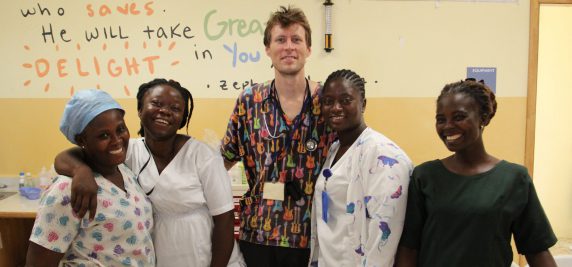Profile – Dr Michael Bryant
Roles – GP from South Wales; spent three years in paediatric clinics in Sierra Leone, including during the Ebola outbreak; has worked at the ELWA Hospital, Liberia, since January 2019
Hours worked per week – 70-80
8am
I lead the morning handover. A team of GP trainees covers the night shifts, with senior doctors as back-up. It’s been a rough night, including three caesareans, a toddler with respiratory distress, dehydration and malnutrition, and a full emergency room following another traffic collision.
9am
I head to the paediatric ward, which we have expanded using funds from a health partnership with South Wales. The centre is developing a malnutrition unit, and diagnoses range from malaria to meningitis, anaemia and pneumonia, requiring oxygen and transfusions.
10.30am
The neonatal area is a work in progress but before it was built feverish babies only got paracetamol. Thankfully, our midwives are becoming increasingly adept. As a GP with a diploma in child health, I’m the most qualified to do the paediatric, emergency and postnatal rounds. Decisions are simpler than in the UK as resources are fewer, but that doesn’t make them easy. How do we address neonatal jaundice without phototherapy and no way to investigate conditions like biliary atresia? What do we do about children brought in late with cerebral malaria in semi-comatose states? Cerebral malaria in particular has spiked recently, with the rainy season.
12pm
I have lunch with an NGO colleague. They’re discussing bringing in a full-time paediatrician, which is a relief. We share ideas about standardising practices in the centres, and I enjoy steering patient care in a way I could never do in the UK.
1pm
Back at the centre, the outpatients clinic is busy. As well as the same variety of conditions we see in Wales, we encounter tropical conditions that are endemic here. One man’s abdominal pain is schistosomiasis – treatable but potentially very damaging – while a two-month-old has a rapid respiratory rate. Her mother is understandably frightened by the cannulas, so I try to demystify them. I also have to juggle our limited oxygen equipment to keep as many children as possible alive overnight.
3pm
Our GP trainee session is on neonatal jaundice. The challenge is translating theoretical knowledge into something useful for West Africa so we can monitor bilirubin levels. We discuss causes and treatments – I’m impressed with the trainees’ knowledge of conjugation pathways and find myself digging into buried recesses of med school knowledge.
4pm
I’m called as an emergency to see a two-year-old who is barely breathing. As I attach oxygen, a power cut plunges the hospital into silent darkness. With no fuss, one nurse connects a 50kg oxygen cylinder to the girl, and another inserts a line while giving antimalarials and antibiotics. In these situations, I don’t bother waiting for tests. An electric pulse oximeter, donated by a Welsh hospital, starts alarming. Despite five litres of oxygen, her sats get no higher than 83%. In the UK we’d fast-bleep an arrest team, but here our ER supervisor calls for a water bottle to set up a makeshift bubble CPAP by playing with nasal prongs and increasing the oxygen to a pressure of 10 litres. The child’s sats reach 97%.
5pm
Heading home, I remind everyone to call me whenever. I’d rather know about crises before they unfold. I then go for a run – not solely to unwind, since I’m also training for a marathon.
7pm
During the evenings, I identify our clinical teams’ learning needs with my wife, who is a post-FY2 doctor. I’m keen to develop an asthma service, so we explore that. I also revisit the paediatric ward to check the power supplies. The nurses are designing feeding schedules with the mothers.
10pm
I aim for early nights as the days are long and tough – but being here is a privilege.

















